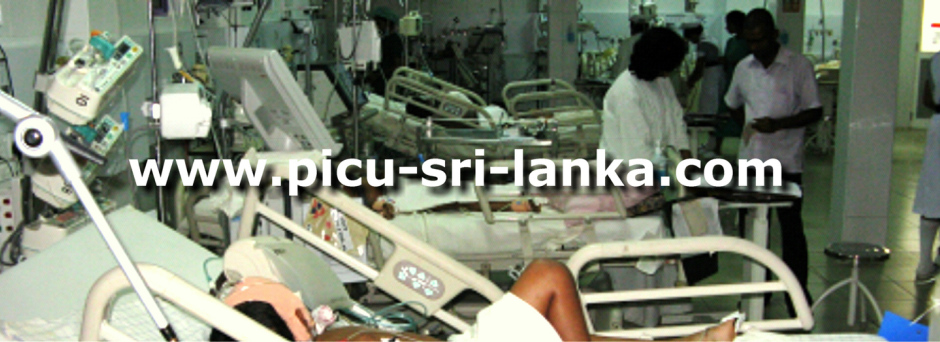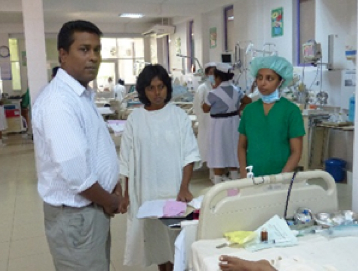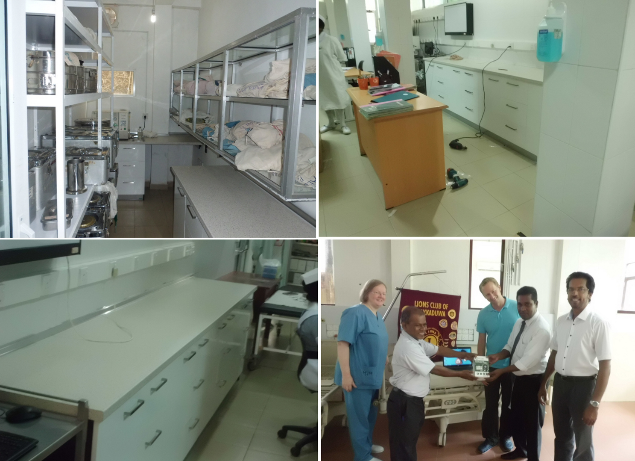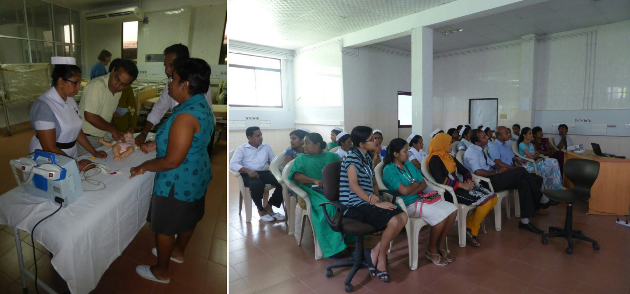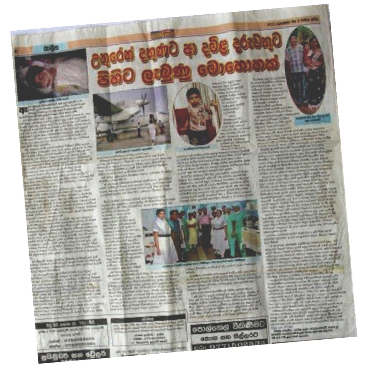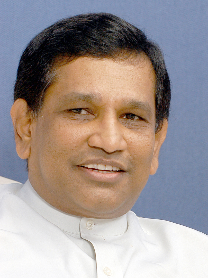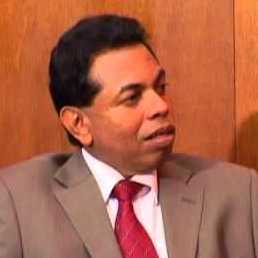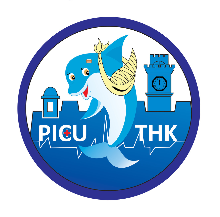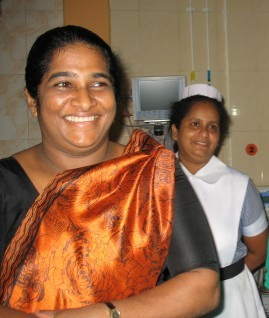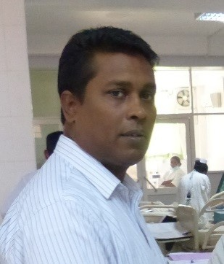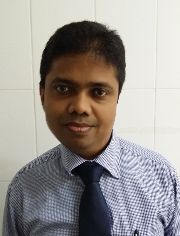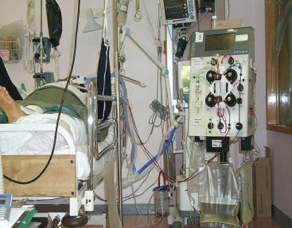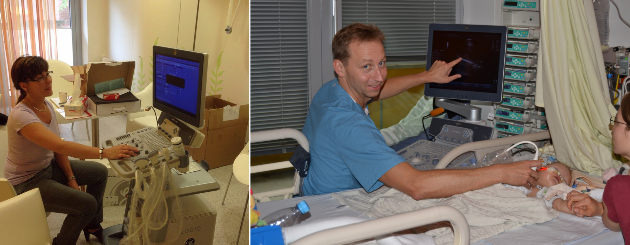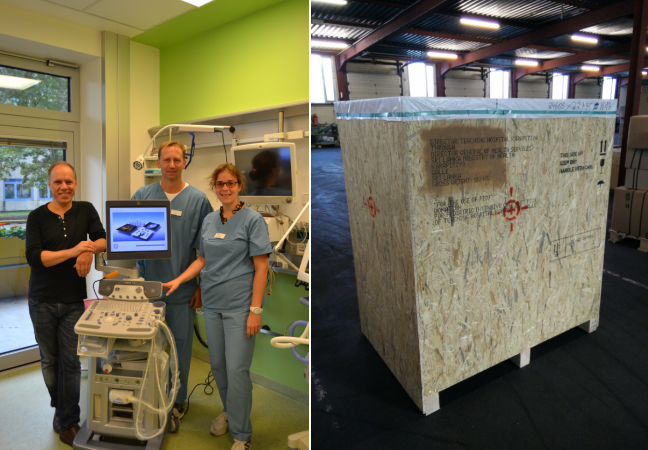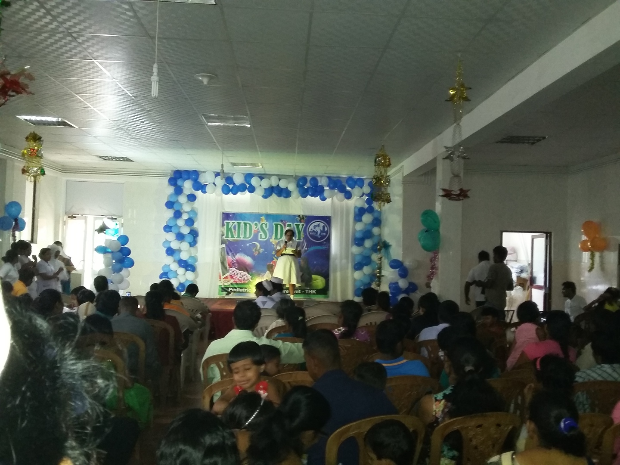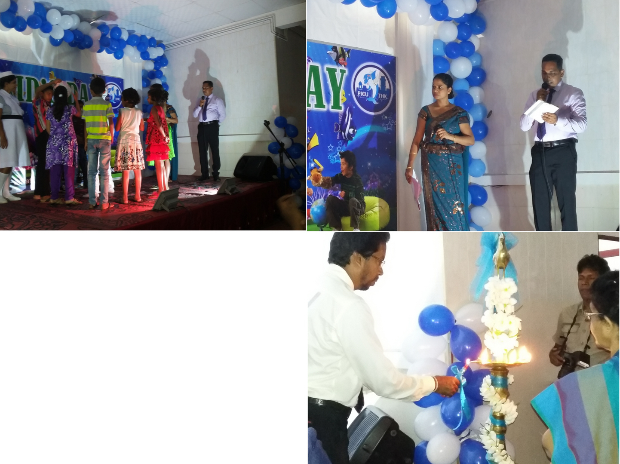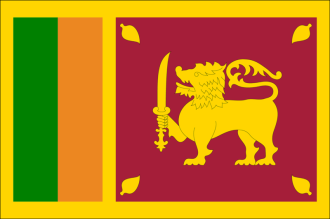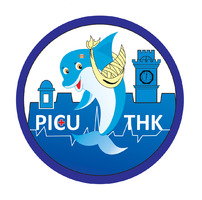Project Story Part 2
October 2014
The PICU team at Karapitiya Teaching Hospital in Galle
Head since 2008 - Dr. Upeksha Liyanage. Expanded by Dr. Manjula Hewageegana, consultant
paediatric intensivist, Lion Nissanka Epaliyana, the local project manager. In total 7 registrars, 3 assistant doctors, 24 nurses und 6 service employees.
Résumé of their stay:
The training sequences in Hannover and Galle have been obviously effective. Dr. Manjula’s presence helps to keep the learning curves after the training sequences longer firm. Good results with respect to team quality. As Dr. Thomas put it „…well, of course one or the other flaw is showing up, which could have been avoided. But this is occurring to us as well… and it seems to be important that we continue having trainings in Galle and Hannover…“. Dr. Udara is managing the weekly skype-conferences and he says „…since we are doing this, we have been able to solve cases which we did not have always under control…“
What’s still missing? Although anually approx. 2.000 nurses are leaving schools there is huge demand in the medical organization of the country since half of them is moving into better paid jobs abroad, predominantly in the Near East. And there is quite some fighting to get a few from those who stay – and PICU is only one of them. Consequently the Intermediate Care on first floor being ready for full operation has to suffer and is only partially operating.
Majority of successes is coming from the operations of the intensive care part on ground floor: Dr. Manjula developed practical operation instructions, absolutely in line with his peers from Hannover, e.g. for intensive handling, care, and monitoring of central venous catheters. And the nurses do obviously learn from the ongoing feedback coming from the check and act type of manegement: They themselves developed a cleaning plan which in all details describes what – by whom – when – by which actions should be done. And obviously the rules are kept!
Here what has been tackled during the stay of the team Medical field:
Major focus was catching a too early decrease of the learning curve by repetition and stepwise progression. Predominantly Reanimation and hygiene. Impressive progression was found with respect to hygiene: Enough disinfection dispensers available, which …”are really used, and correctly!”… as Hannah put it. The disinfection material itself (sterillium) is paid by PICU Charity Group as standard products at hand in the hospital are far under intensive care standard. WHO posters are hanging at the walls. Dr. Manjula is regularly running hygiene trainings. And not to forget – the Hannover team brought a broad variety of missing products over, particularly pharmaceuticals. Quite a pitty that the huge 40‘ container reached Galle after the team went back to Germany.
So-called „extra-functional “subjects
are becoming more and more important: Accuracy, sustainability, overlapping work and multitasking, speed, management of the smaller issues, as for instance getting craftsmen earlier for repair and maintenance works, instructing them more precisely instructing the crafts, influencing the hospital administration for concerted action and support of what’s needed differently in PICU compared to normal wards, trying to gain influence health policy, establishing local fund raising and founding a national charity group – just to mention some of the more import extra-functional issues.The German team was continuously confronted with the outcomes of the Sri Lankan medical system organized firmly as command economy, missing individual and personal initiative, strictly focused on the given and sharply bordered personal task, together with an extremely stiff hierarchy with multiple layers, in which communication is only possible on the same hierarchical level, together with top-down decisions.
Dr. Jack: “This time we had to address more as expected to PICU’s condition frame. The existing one is full of stumbling blocks to achieving intensive care excellence. Too much of what we wanted to introduce was hindered by misfit of driving conditions.” This went for instance so far, that the German team had to manage the enormous flow of water coming in from heavy monsoon showers, when they circumvented the water masses with easy means into a ditch which was not used, in order to avoid a continuous flooding of the PICU which sometimes led to its weeklong closure.Same thing with making sure that the elevator could be operated continuously when heavy rain water was as well circumvented. PICU staff was standing more or less helpless aside – they did not understand this as their task but the hospital technicians’ jobs. Or another example – the German team approached the Director General for Hospital Services in Colombo – not the THK administration - in order to getting more nurses and earlier.
PICU medical equipment on a good level.
We had to re-focuss more on internal logistics, e.g. storage room and boards for consumptive goods and improvement of structural issues like preventive maintenance. In spite of precise plans from Germany there were no ventilators or absorbers foreseen in wet rooms and damp areas. No wonder that there were fungal problems arising.
The MHH team got enough money from PICU Charity Group so that they were in a position to by missing equipment locally. To be seen partially on the pictures, e.g. washing machine and dryer, cup boards, replacement cables for monitors, a laptop for improved skyping…
Here are a few snapshots from the daily routines of the MHH team…
Aluminium shelves were made by local crafts. Lockable drawers and cupboards for pharmaceuticals were bought, together with a laptop to improve the skyping sessions.
Reanimation lessons. All lectures in front of nurses and doctors from another wards as well.
December 2014
Severely diseased child from Jaffna rescued
Jaffna is located in the utmost North of the isle right within the former civil war zone. The worried parents, supported by the local hospital doctors put their last hope on the leading children hospital in Colombo. But unfortunately they were not able to fit in there, instead they recommended to try the new PICU in Galle, which have proved to have an answer in challenging questions. And Dr. Manjula and his team agreed to try everything and they made it. Now - problem was how to organize the aftercare. The doctors in Jaffna agreed to do it within the intensive care unit for adult patients. Transportation by car over more than 800 km? Impossible. The Ministry of Health had been turned on and a military plane was chartered. A small PICU team coached the transition to Jaffna, ongoing ventilation during the flight. And they reached Jaffna safely.
This was the first air fare transport of patients ever in Sri Lanka in Sri Lanka, done under continuous ventilation. Right to be proud for the PICU team. And for us, the supporters, another example how persistence is paying off.
January 2015
The political scenario has changed fundamentally
New President, new Minister of Health, political reorientation of the country, clear targets.
On January 8th a new President had been elected – the previous Minister of Health, Maithripala Sirisena, won the election; exactly the one, who had already been friendly connected to us; the one who gave us the political backing for the PICU development, and the one who wanted PICU to become THE lighthouse project for similar institutions in other regions of the country.
It seems as if with him a new era for Sri Lanka might have begun: It’s his credo to bring peace back to the country after ending of decades of civil war and horror for people. The first things he did - he summoned a Tamil as Chief Judge, promised to re-install the Parliament again as most upper power authority, promised to decrease the operative role of the President, with other words limiting his own power, to revise the strong reference to China, turning again more to the West, and to fight corruption. Regarding the latter he pointed out in one of his inauguration speeches that at present you have to spend 9 dollars before an investment of one dollar would be possible. He introduced a 100 days programme with clear cut objectives for his Ministers and said that nobody would stay in office who did not achieve these objectives. As part of his so-called Manifesto you can find other targets, which will have for sure significant influence on our PICU project. For instance: The governmental expenses for health will be immediately increased from 1,8% to 3,0% of the BIP, which will have clear impact on increase of own investment budget for the PICU and let the PICU management get earlier in the driver’s seat. If somebody is interested – here you have the link to the President’s outstanding and striking „Manifest“: http://www.maithripalas.com/wp-content/uploads/2014/12/Manifesto-English-for-proof-reading.pdf
A new Minister of Health was appointed:
Hon. Dr. Rajitha Senaratne, officially named as – Minister of Health & Indigenous Medicine. Once educated as dental surgeon he gained extensive experience as politician in higher office. His wife, dental surgeon as well, was for many years Medical Director of Lady Ridgeway Hospital in Colombo, the number one paediatric hospital in Sri Lanka – not even bad for the PICU project if we remember that the founder of the PICU initiative, Dr. Punchihewa, is now working right there.
Very good for us – our well-known and so supportive Director General for Hospital Services, Dr. Palitha G. Mahipala, stayed in office, and we are keeping regularly and directly contacts with him.
Together with his President, Dr. Mahipala will have to „crack a big nut“: Eventually making the construction real of the „Helmut Kohl Mother and Child Hospital of Karapitiya Hospital“ after the disappearance of all money funded in a black hole. A shameful example of German development aid – in particular as part of the same hospital we are in with the PICU and right on the other side of the road. For those interested in the whole story – here is the link: http://www.dailynews.lk/?q=local/restart-work-helmut-kohl-maternity-hospital-galle-public
Meanwhile there is a low interest credit offer from the KfW for the late realisation of the 600 bed complex.
January 2015
PICU team in Galle created a new logo.
The story behind: Injured dolphin kiddy. Successfully treated after ECG check (see the graph) in Pediatric Intensive Care Unit (PICU) being part of the Teaching Hospital Karapitiya (THK) located in Galle (see the fortress walls). At present they are looking for the dolphin’s name.
February 1, 2015
PICU under new leadership
Dr. Upeksha Liyanage moved to Out Patient Department of the THK.
New head of PICU now Dr. Manjula Hewageegana
From the very first moment on - Dr. Upeksha was there. Right after Dr. Punchihewa’s transfer to Lady Ridgeway Hospital, the largest Children Hospital of the country (Dr. Punchihewa was the person who brought us into the game) the young Consultant Paediatrician took over. PICU still in the initial starting phase of physical construction. Successfully! She ran through all advanced education and training which the Hannover Medical School was offering – all focusing on paediatric intensive care; partly in Hannover partly in Galle. The transfer into the unprepared local intensive care culture always on her shoulders.
For the longest period of time from at first two fully equipped intensive care beds to now seven she was round the clock the only contact person. During her tenure PICU grew up to 40 persons – 10 doctors, 24 nurses and 6 helpers. And day by day she had to fight that PICU was accepted as important and necessary part of the hospital. Reason was that PICU represented a new breed of paediatric medicine, which at the beginning brought nothing but trouble for the hospital administration – since each progress burdened the budget.
Now she had been appointed VP of the Out Patient Department of THK. Establishing more OPD’s all over the country and by this being able for advanced treatment of patients is one of the strategic political targets of the new President to be realized by the Ministry of Health. Selection of Dr. Upeksha – quite a nice choice!
During her time as head of the PICU the admission totaled to more than 800 heavily ill kids. Most of them could be saved. She was a very nice partner for all her peers here in Hannover – and what we are happy to say – she became our friend.
„Dear Upeksha, for your new job in Out Patient Departments of THK we are wishing you all the best. And we are sure – there it will go forward as fast and as successful as in PICU!“
Dr. Manjula Hewageegana started as head of PICU on February 1, 2015. Just to remember – he joined PICU two years ago being the first paediatric intensivist ever giving PICU a remarkable push forward. Dr. Manjula gained his certification in Australia, collecting experiences for a couple of years before he returned to his home country. Very soon after he took over more and more professional steering tasks, e.g. the regular hygiene morning training for the nurses and helpers.
Without exaggeration we can now expect that PICU will achieve a significant development step: The MHH team and we, the supporters, can now more and more move into a slightly different role compared to the past – more supporters in the true sense of the word, professionally and financially, and less giving direction. Leadership should come now more and more from Galle.
„Dear Manjula, very much success for your new role! And all the best for PICU’s future. We promise to support your further development process of the unit as we did it all the years!“
Promising new accentuation
Outcomes of our permanent nudging at hospital administration level: Recently there is a service contract for the two most valuable ventilators. And the hospital purchased another one which is now running. Furthermore they bought two multipara-monitors for the supervision of complex medical interventions.
Even still more important is the announcement that PICU will get a second paediatric intensivist – one of Dr. Manjula’s peers from Australia.
During his time in an Australian hospital Dr. Manjula gained positive experience with High-Flow-Nasal- interventions. The Cannula HFNC therapy is there successfully implemented since years when it comes to handle critical respiration conditions after ventilation or after intubation after pneumonia, severe asthma or bronchitis or even to avoid intubation, or in connection with acute respiratory failure. Sponsors funded the purchase of two HFNC machines, which will be used very soon. A further upgrade of the PICU technology.
Further on a modern mobile sonograph is missing to be used from very small children up to larger ones, and possible for use in a broad span of cases. It is very important to increase the quality of imaging processes within the PICU in order to accelerate diagnostics. These machines are expensive – but they are urgently needed. Part of that increase in imaging diagnostics is also an x-ray machine; the MHH tam is complaining since long that this is missing. And not to forget: An increase in Technology will always force an upgrade of the electric power supply.
March 30, 2015
The PICU was already since several months certified as advanced training centre for consultant paediatrists and a place for education and training of ongoing paediatrists right after university. On March 30, 2015, Dr. Manjula run his first so-called Mortality & Morbidity Conference. More than 50 practicing physicians, GP’s, hospital doctors, and nurses attended. It was Manjula’s intention to explain the conditions for emergency admissions and to discuss fatal events with experienced colleagues in order to find future solutions for avoiding those events. He tabled six cases which were commonly analysed Even in so-called Western countries mortality conferences are not standard!
PICU performance for the first quarter of 2015
Apart from the admission rules and reg’s six mortality cases were discussed, evaluated, and commonly analysed in order to get rid of possible future mistakes and to establish new common standards regarding admission and treatment. Here a few issues of Dr. Manjula’s balance for the first three month of the year: 75 patients were enrolled (87% usage of capacity), 69 could be treated successfully. Span of age of the children fluctuating between < 1 month and > 12 years; whereas the group of 4 to 5 years old and the group of 5 – 12 years old dominated. Most admission came from the Southern Province (Galle, Matara, and Hambantota). Heaviest cases came from Colombo, which is the most advanced paediatric hospital in the country. The treated cases underline that the President’s target – to focus on treatment quality of kidney diseases (15 cases). Postoperative treatments were on the same level (15 cases), followed by respiratory problems (13 cases), whereas the treatment of respiratory problems required most of the capacity. More than half of the admission were emergency cases, where the patients would have been dead within shortest time
How important it is to increase the capacity of the IMC on first floor can be understood when Dr. Manjula reported a case of 436 days stay in the PICU; while the average stay in PICU has now come down to approximately 7 days. There still room for progress!
May 2015
Second consultant paediatric intensivist hired
Very happy to announce – PICU has got a second Paediatric Intensivist! Dr. Pradeep Gamage,
finished his professional consultant diploma as PI in Australia, where he then stayed for some years in order to gain further experiences. Now he came back to his home country. Dear Pradeep, all the
best from your German partners!
This is an important step forward to PICU’s improved autonomy, as the MHH team has got now another equal partner.
One of our most important local project sponsors and one of the most relevant success factors for the PICU development, the Director General for Hospital Services, Dr. Palitha Mathripala, made recruitment of Dr. Pradeep possible. So competence was significantly enhanced. And now another peer for the Hannover team was now at work. Possibly also another factor for reconciliation towards the medical bureaucracy around PICU. In particular regarding the somehow poorly equipped PICU with consumptive goods.
CVVH-machine for hemofiltration.
A so-called CVVH-machine for hemodialysis. “Continuous Veno-Venous Hemofiltration” is a substitute for hemodialysis that runs continuously on a machine that stands at the bedside. There are different kinds, all coming under the general heading of “renal replacement therapy”. In one of his inauguration speeches, the new Sri Lankan President, Maithripala Sirisena, announced that among others medical political strategy will focus on fighting kidney diseases for children being far above average in the country. You see – we are in line with what’s needed locally. Manjula and his team will undergo training for handling the CVVH equipment.
Juni 2015
Container with donations arrived
Dr. Juergen Morhard, German Ambassador in Colombo, together with numerous members of the Hikkaduwa Lions Club, eventually handed over medical equipment and consumables collected by the PICU Charity Group which has been sent over end of last year. And now those goods not fitting into PICU’s operations, as toddler beds and various textiles e.g., were given to the two children wards of THK.
Dr. Jürgen Morhard, German Ambassador in Colombo is handing over the gifts from Germany. Greatfully received from THK officials.
July 2015
Successfully combating a flu epidemic.
Effects of dangerous flu virus type H1N1 on children had been brilliantly managed.
In July Sri Lanka was hit by a flu epidemic caused by the dangerous virus type H1N1; especially kids were hit. More than 60% developed most serious lung infections. All seven beds equipped with ventilators were occupied round the clock. On and on it happened that parents came in for admission with their children much too late. Dr. Udara reported that despite this fact most of them could be successfully treated. Without PUC a couple of years ago this would not have been possible at all. Good news: PICU has got now a very effective flu medication compared to our well known Tamiflu.
By the way - Dr. Udara and his colleague Dr. Sulari were also incidentally caught by the flu; together with three lady doctors in maternity leave there were large shortages in personnel and the remaining doctors had to work seven days a week 24 hours per day.
Development of competencies:
Weekly Jour-Fix per skype PICU cases to be discussed. Important learning segment.
Between the training sequences for the Sri Lankan doctors and nurses in Galle and Hannover the most important training is around the weekly, as it is called “Jour-Fix”, always Thursdays at 10:30 MEZ. In general all PICU cases will be discussed. In July it was about the above described influenza epidemic.
And possible treatment strategies for bacterial super-infections: In any case mechanical ventilation is necessary, something that’s excellently mastered by the PICU team. Nevertheless from time to time there are negative outcomes to be reported as well, for instance due to much too late transition by a local doctor a little patient died.
The Hannover team is always very satisfied when they hear from Galle that the THK-ICU is working with full capacity. Mostly Dr. Udara is acting as skyping partner of Dr. Thomas Jack.
Transfer of PICU experiences to Sri Lankan paediatrists.
Dr. Manjula Hewageegana lectures and runs seminars; paediatrists are coming into PICU for practical learning. By this the doctors should get to know what would be possible by that new unit and in which situations admissions into the PICU would be advisable. As once introduce by his predecessor Dr. Upeksha Liyanage Dr. Manjula has continuously young doctors and even students for internships in his unit.
October 2015
"The Eagle has landed" that's what the PICU team mailed. The mobile ultrasound system has been eventually delivered. 200 kg to be unpacked, getting to know all operational details and start of instruction. Now time has come for a further significant and strategic development step for our PICU: Introduction of imaging diagnostics. First step: Procurement of a state-of-the-art mobile ultrasound system, to be used directly at "bed-side" by which it will be also possible to assess cardiac functions. Another performance driver towards most effective care of heavily ill little patients in Sri Lanka. And so Galle will be coming significantly closer to paediatric intensive care standards as they have it here in Hannover Medical School. After appropriate configuration to Sri Lankan terms by a professional from GE and an in-depth test by Dr. Thomas Jack the whole MHH staff was impressed of the quality. In order to avoid any delay in application and use in Galle the machine, together with disinfection tissues and transmission gel, was sent per airfreight to Colombo.
Clear what has priority now for the MHH team: In-depth training for the PICU doctors and nurses so that they are able to gain maximum outcomes from having that leading edge machine available. Those paediatrists having once been educated as paediatrists in Anglo-Saxon countries did not get advanced training in sonography. By work partition that is done there by radiologists or even sonographists. The German team relies on their experiences regarding a higher effectivity if it is done directly at bedside by paediatrists.
A special story was how to get such valuable system as LOGIQ P6 as a gift into Sri Lanka….without paying for various import fees. Dr. Palitha C. Mahipala, Director General for all hospital services in the country and, PICU friend since long, made it possible, after two months of waiting. Difficult for us to understand that goods delivered to making the country project of building a lighthouse PICU for Sri Lanka should be charged with import fees…
Configuration by a GE expert Dr. Thomas tested it through its paces.
The Hannover team would have liked to keep the LOGIQ P6 for their PICU.
Ready for dispatch; 193 kg nicely packed
December 2015
Kid’s Day: The PICU team invited former patients and their parents.
Riht before Christmas, Christmas is also celebrated in the Buddhistic Sri Lanka, the PICU team invited all 2015 hospitalized little patients together with their parents for a so-called KID'S Day; a festive, but at the same time cheerful event driven by gratitude of those concerned. This gratitude may in particular be understood as an important positive feedback for supporters and friends of the PICU development initiative.
